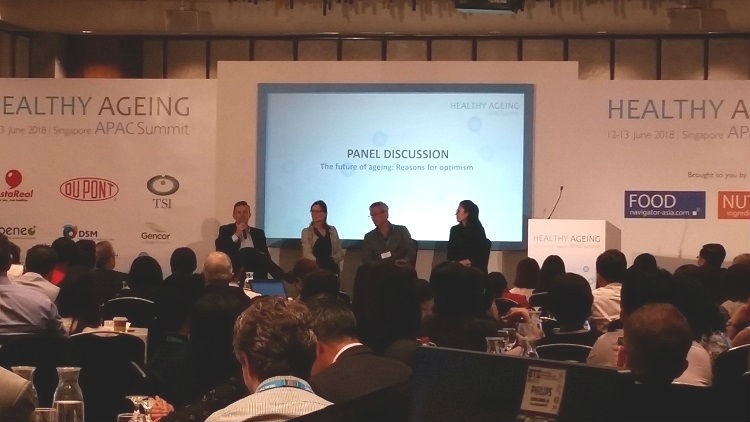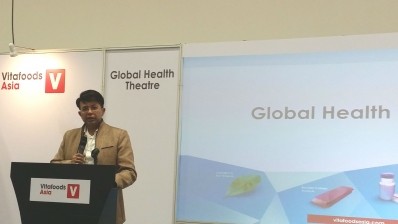Healthy Ageing APAC Summit 2018
Healthy ageing: Better diets or personalised nutrition — what's the best approach?

The panel included Dr Femke Hannes, regional lead for Nutrition, Science, Advocacy DSM Nutritional Products APAC, Dr Paul Clayton, fellow of the Institute of Food, Brain & Behaviour at the University of Oxford, and Alina Uchida, product development director from Imagene Labs.
Along with moderator Gary Scattergood, Editor-in-Chief of NutraIngredients-Asia and FoodNavigator-Asia, the panel discusses factors that affect ageing.
Uchida who was the first to speak, said that genetics and lifestyle choices each play a 50% role when it comes to ageing
Thus, there is a need for personalised nutrition, so that the right nutrition is taken to fit the bodily needs.
“For example, if you go to the doctor, he may tell you to do this to boost this…But they can’t tell you if you can or cannot utilize the things you took in to boost …”
“Knowing how genetics affect how the body processes, that’s a valuable piece of info.”
However, Dr Clayton argued that that an “appropriate diet”, instead of “personalised nutrition” was sufficient to maintain health.
“I am not sure if I agree with the 50-50 genetics and environment ratio,” he said.
Citing historical examples, he said that during the second half of the 19th century, the general population in England was “extraordinary healthy”. Cancers accounted for less than 5% for all deaths, and the population certainly did not receive personalised nutrition, he added.
He said that growing old did not need to equate to ill health.
He gave the example of sacropenia, a muscle loss disease, explaining that it has “nothing to do with growing older, but is result of dis-nutrition and chronic stress.”
He thus believes that “an appropriate diet that enhances multiple defences” would be sufficient for good health.
In response, Uchida argued that genes and personalised nutrition were still relevant to health, because the types of food that people are eating today, differ from those consumed in the past.
“The food now is totally different from back then. The genes don’t change, but with the change in food, this will affect how our genes express itself.
“Thus, I wouldn’t stick to 50-50 (genetics and environment ratio) hard and fast. The ratio changes slightly depending on context.”
Public health – whose responsibilities?
Dr Clayton added that it was the regulatory environment, rather than scientific problems, is hindering good nutrition for the public.
“The problem now, is that food manufacturers have no interest for public health, because the burden is borne elsewhere,” he said.
“They (manufacturers) are more interested in shelf-life and profit.”
“Young people today are 10 years older than their parents than they were previously...We are not on the right nutrition path.”
As such, major obstacles in providing good nutrition, is no longer an issue with the lack of scientific advancement, but with regulatory policies.
He concluded that public health challenges are “more political than scientific.”
Holistic approach and detection
With regards to promoting public health, Dr Hannes said that DSM was working with both academia and industry to drive behavioural changes.
“We want to drive behaviour change, early detection and assessment to help to drive change and make people think differently about their health.”
The firm also believes in focusing on personalised nutrition through genomic testing, which they see it as a form of predictive health testing.
It is also looking at three tiers of innovation, namely improving bone health through consumption of vitamin D, product development and diagnostic tools for personalised nutrition.
For vitamin D, she said that it has improved bone health by reducing the number of falls by 72%.
For product development, the firm is developing products to tackle in type 2 diabetes.
“We always make sure we have pipeline development and beyond fibres and reformulation.”
She added that the firm believes in lifelong investment in diet.
Uchida said that her company was also focusing on a more holistic view, on how emotional wellbeing plays a part in physical wellness.
“All these things will impact your expression of genes,” she said.
“If we look at future generations, if we stay on proper nutrition and lifestyle choice, that could lead to healthier genepool.”
In conclusion, the three are still optimistic on the concept of healthy ageing.
Dr Hannes said that she is optimistic of the population achieving a longer lifespan, while Dr Clayton said that progressive pathologies can be avoided, thus providing good prospects for healthy ageing.
“I am very positive on future of ageing, at no point in history we are more in control of our health, how well we age depends on how well we eat and exercise. It is all preventable,” added Uchida.



















